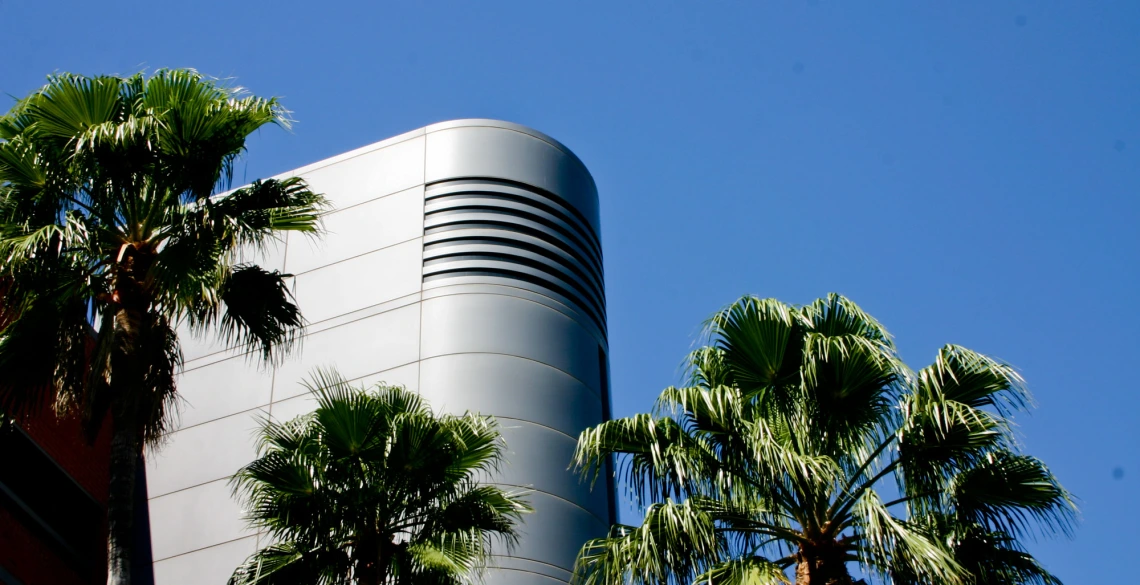Robots: One Day They’ll Walk Your Dog, Do Your Dishes, Tutor Your Kids, and Take Grandma to a Show
Symposium on understanding the mind and brain will bring engineers and scientists together to take stock of progress in making robots think and act like people.

The electrical and computer engineering building on the UA campus.
How would like to come home to find the house cleaned, a gourmet dinner on the table, and the dog walked? Not to mention a personal tutor teaching your kids higher math and Chinese, and your elderly grandmother out visiting friends and attending a concert with a companion that remembers all her likes and dislikes and hangs on her every word?
How much more would you like it if all these utopian services cost about the same as a payment on an economy car? And how would you like it if all these things were done by intelligent humanoids -- robots?
The groundwork for this future is being laid here at UA at the Symposium on Multidisciplinary Approaches to Understanding the Mind and Brain, to be held May 9-11 at the Tucson Marriott University Park.
The symposium has been organized by associate professor Tony Lewis of the UA Department of Electrical and Computer Engineering, and associate professor Jean-Marc Fellous of the UA Department of Psychology.
Different Brains
Lewis believes the time is ripe to push forward this vision. "We have had tremendous speed increases in computers and in robotics," said Lewis. "We have robots that can give people guided tours in large museums and can drive across the country autonomously. What we still need to understand, however, is how to model a human-like brain and put it into a robot that will be compatible with humans, that will reason like humans, and that will be able to form the same kinds of bonds of attachment needed for truly warm and compassionate care."
Lewis notes: "There is a tremendous amount of information out there about the brain, but psychologists, mathematicians and engineers have a terrible time communicating with each other." Once this communication barrier is broken down, Lewis sees progress accelerating at a fantastic pace.
"All the pieces are falling into place, we just need a framework for multidisciplinary dialog as we advance forward," said Lewis.
To address this problem, Lewis and Fellous decided to organize a multidisciplinary symposium to bring together scientists and engineers from UA and around the world to sit down and listen to one another's views of the mind and brain.
Luckily, the symposium came together quickly after a special guest agreed to give an important keynote speech. "Michael Arbib, one of the founders of brain modeling, agreed to be the anchor of this event," Fellous said.
Brains Are Machines
Forty-five years ago in a landmark book, Brains, Machines and Mathematics, Arbib proposed that a synergistic understanding of brains and machines and their underlying mathematical principles could potentially provide rich insights into the very nature of behavior and the mind.
Decades before the birth of what are now known as computational neuroscience and cognitive robotics, Arbib predicted that computational modeling would revolutionize the way we think about the nervous system, from a frog's eye to human language.
"The symposium looks like it will be quite a success based on the response we got," Fellous said. "We have had to turn away a number of well-known people in this field because the schedule filled up so quickly."
One of Lewis' students, Matt Bunting, created quite a buzz in the robotics world last year when Intel asked him to build two more of his hexapod robots. Bunting built the first robot as a class project for UA cognitive robotics class ECE 596C, taught by Lewis.
The symposium will be held May 10 and 11 at the Tucson Marriott University Park immediately adjacent to campus. Registration is $70, but attendance is free for UA students, staff and faculty. The event is sponsored by the College of Engineering, the College of Science, BIO5 and the Office of the Vice President for Research.

